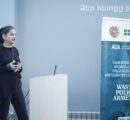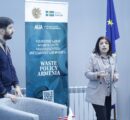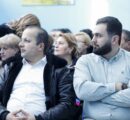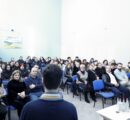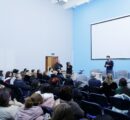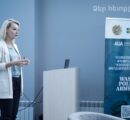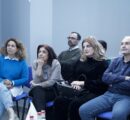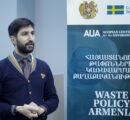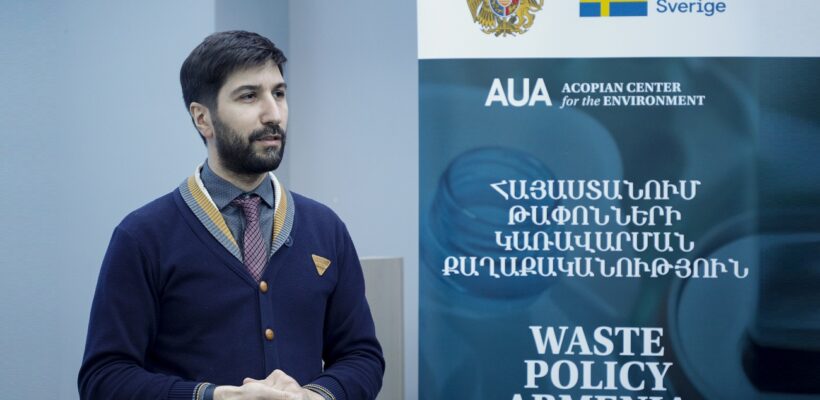
AUA Acopian Center Holds Public Consultation on Waste Source Separation in Sevan
3 min readSevan, Armenia — On February 22, the American University of Armenia (AUA) Acopian Center for the Environment (ACE) held its first public consultation with residents of Sevan Municipality in the framework of the Sevan Waste Sorting Project. This project is part of the AUA Acopian Center’s Waste Policy Armenia program funded by Sweden.
The Sevan Waste Sorting Project aims to support the municipality of Sevan in increasing public awareness and enhancing the municipal government’s technical knowledge of source separation. Upon achieving progress on key milestones, the Project will provide the municipality with equipment and infrastructure support to roll out the new waste source separation system.
This first public consultation, held at the Sevan Business Center, assembled around 60 residents of the community. The consultations aimed at collecting views and concerns about source separation of waste from the public, private sector, and local self-government agencies. Their input will help develop the program outputs in accordance with the community’s needs and requirements.
Program Manager Harutyun Alpetyan presented an overview of the project objectives, highlighting the benefits and challenges. He emphasized the critical role of the local community in ensuring long-term sustainability of the project results.
Also, the Project team presented preliminary findings from the public opinion survey of a representative sample of 400 Sevan residents conducted in early February by the AUA Center for Business Research and Development as part of the Sevan Waste Sorting Project implemented by ACE. The findings showed that over 90% of survey respondents consider waste sorting an important issue. Moreover, over 70% reported that they would definitely separate waste in their households if local authorities organized a collection of sorted waste.
The participants raised questions about the destination of sorted waste, potential for recycling, or if recycling plants even existed in Armenia. The project team explained that the country has the capacity and that there is a demand for sorted recyclable materials. The challenge will be to keep increasing the purity rates of sorted waste by minimizing the disposal of unwanted items in the sorting bins.
Sevan residents highlighted the importance of maintaining transparency with reporting the quantities of sorted waste and the potential revenue generated from the sale of recyclables. They noted that a transparent relationship with residents is necessary to build trust in the system and ensure its sustainability.
There was some discussion on potential locations for placing sorting bins in public areas and broader compliance issues. The meeting attendees agreed that Sevan residents should take ownership of the new waste sorting system, including the distribution of sorting bins, sale of recyclables, and allocation of sales revenues from recyclables. Many also raised the criticality of engaging schools and kindergartens in promoting waste separation among the younger generation.
The Project’s Human Rights and Gender Expert Anahit Simonyan informed the attendees about the Project’s focused attention to several important considerations in implementing waste management policy and infrastructure reforms, such as a new source separation system. Inadequate waste management may prevent a community from having decent living standards with healthy and safe living and working conditions as well as a clean environment. Therefore, it is a priority for the Project to ensure adequate measures for protecting the local environment; preserving the health and quality of life of the local population; ensuring the safety of working conditions; and providing infrastructure and management support that is both inclusive and equitable.
Representatives from the Ministry of Territorial Administration and Infrastructure of the Republic of Armenia and Sevan Municipality reaffirmed their readiness to support the project. With the collaboration of all stakeholders involved, adoption of the new waste source separation system would be an important step toward creating a more sustainable future for Sevan, including enhanced living standards, improved economy and healthier environment. Based on the success of the Sevan Waste Sorting Project, the Waste Policy Armenia program will scale up the intervention to other municipalities in Armenia.
The Waste Policy Armenia four-year program implemented by the American University of Armenia (AUA) Acopian Center for Environment aims to achieve three main objectives: to support the RA Ministry of Environment in developing and adopting an Extended Producer Responsibility (EPR) system based on EU best practices; to support the RA Ministry of Territorial Administration and Infrastructure in the development of a national model for source separation of solid waste and introduce it as a system in the town of Sevan and other target municipalities; and to build sector capacity for scaling up the system to other municipalities. The main beneficiaries of the program are the Ministry of Environment, Ministry of Territorial Administration and Infrastructure, and Sevan Municipality.
The AUA Acopian Center for the Environment, a research center of the American University of Armenia (AUA), promotes the protection and restoration of the natural environment through research, education, and community outreach. The AUA Acopian Center’s focus areas include sustainable natural resource management, biodiversity protection and conservation, greening the built environment, sustainable energy, as well as information technology and the environment. Visit http://ace.aua.am.

